I gave my mother an iPad for Mothers Day a few years ago to which she sighed, "What on earth am I going to do with one of these things?" Since then, her digital capabilities have drastically increased. In fact, just the other day she exclaimed, "You know, none of my friends on Facebook commented on my new pictures. I just can't believe it!" Given this example, one can see that even baby-blooming late adopters to the digital revolution inherently understand the underlying etiquette subtly present in online communications. And, liking your friends' Facebook posts is just the tip of the iceberg. In today's high-tech world, it is vital to maintain an online presence, and take actions that add value to others, and to yourself. Afterall, as my now tech-savvy mom says, "Good manners work everywhere...even in cyberspace."
Consider your online identity as an extension of your self
Depending on where you live, there are various social customs that are considered polite, or impolite. Take the southern states in the U.S., for example, where holding the door open is a chivalrous symbol of good manners. In the same vein, failing to follow online etiquette can be perceived as a virtual door-slam in the face. So, consider your online identity as much you as your in-person self, or maybe even moreso, because your digital fingerprint is in many ways eternal. If you don't hold the door open for someone at a local restaurant, you've only snubbed one person's feelings, with only a few bystanders noticing your uncouth act. However, if you fail to act appropriately online, you've now put your foot in your mouth in front of an audience of thousands, or even millions. Take this sobering tale as an example:
Online communications should be well thought-out, and incredibly polished.
Justine Sacco, a PR Director at InterActiveCorp, only had about 200 Twitter followers when she boarded a plane in London headed to South Africa in late 2013. Just before taking off, Ms. Sacco posted this infuriatingly offensive tweet:
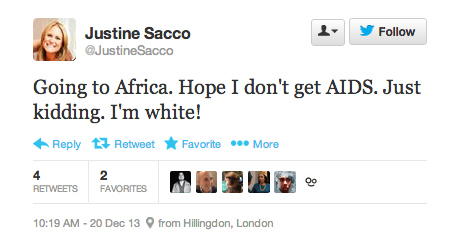
Can you believe she was a PR Director? Faux-pas to the extreme.
During her 11-hour flight, Ms. Sacco was oblivious to the number of responses she received to her racist tweet. Soon the hashtag #HasJustineLandedYet became a worldwide trend on Twitter, as major news organizations like The New York Times, and CNN picked up the story. Justine Sacco's name was tweeted more than 30,000 times, and the hashtag #HasJustineLandedYet was tweeted more than 100,000 times.
So, the moral of the story? Think before you hit send. And, that's really the beauty of digital communications, and why digital communications should be more articulate than in-person communications. With digital speech, we get the power to edit our words before we showcase them to the world. That power is essential in building your personal brand.
Personal branding allows you to manage how others perceive you
Of course, one can just as easily create a positive trend online, by curating a positive brand image. Cultivating your personal brand's presence online gives you a unique advantage as opposed to in-person communications. With online profiles, you have the unique advantage of editing your content, and strategically planning your personal brand.
Your online identity is crucial not only as a job-seeker, but also for employees of organizations. Proudly display your job title in your social media profiles, and tweet about the awesome things your company is doing. This is not only a way to show support to your organization, but also to get noticed by higher-ups.
Remember, it's important to showcase relevant content for your audiences. You can easily filter your audiences on Facebook, and post specific messages to specific groups. Use hashtags to post messages to specific topics. With meaningful, and relevant content, you'll keep your followers coming back for more, and hopefully attract even more new followers.
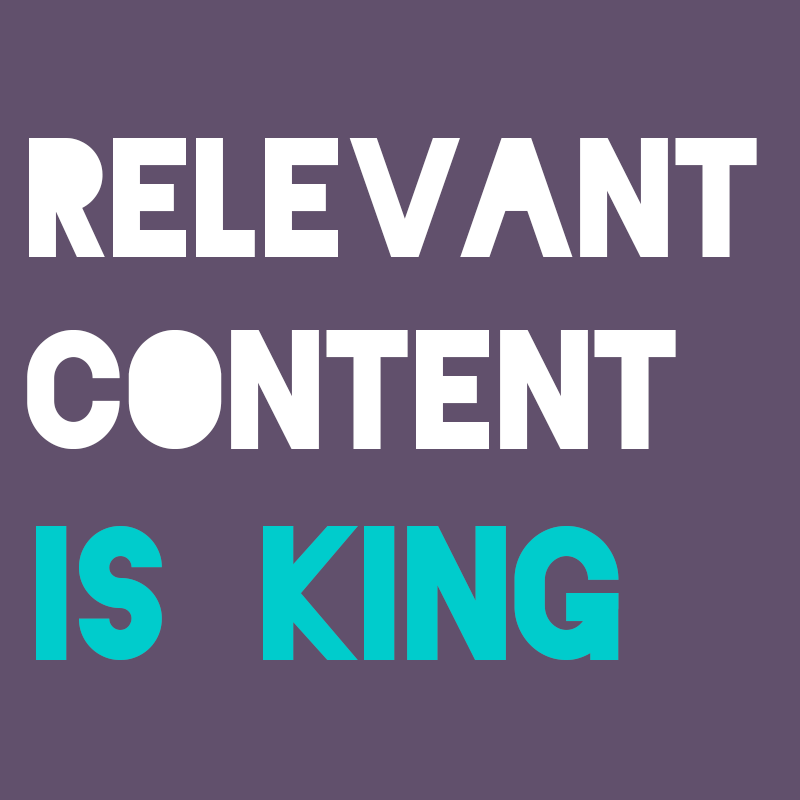
Are you sharing meaningful content to your various audiences? Remember, relevance is key.
Communicate your passions, and expertise
Blogs, and social networking sites allow you to show others what you're passionate about. Communicating in the online sphere also allows you to show your expertise in various fields. It may not be easy, but it is definitely worth it to try to climb the social ladder of the web. Go ahead and check your Klout score to see how you're doing, and then plan some goals for the upcoming quarter.
Here's some easy examples: -1. Increase my Twitter follower count by 300. -2. Write 1 blog post per week. -3. Increase my Facebook engagement
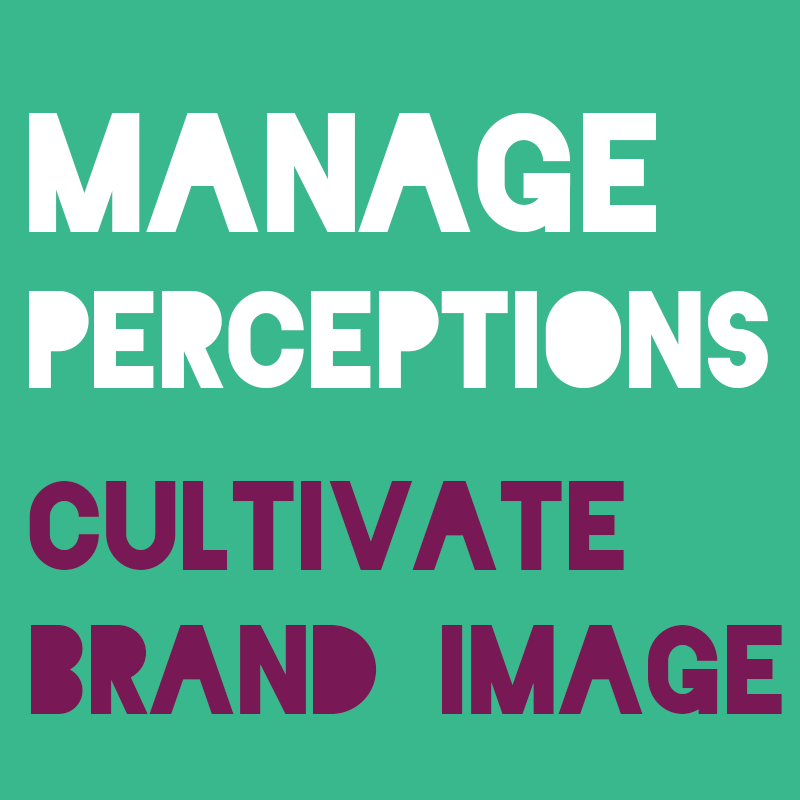
Do you want to be a thought-leader in technology, for example? Then, start pushing awesome tech content to show the world your expertise!
Make connections based on interest
One of the greatest advantages of social is the ability to connect with others. Sure, we're all connected to friends and family on platforms like Facebook, but are you also using Twitter, and LinkedIn on a daily basis? These platforms allow you to connect with people that you may not know in real life. Now, that might sound a bit creepy to some, but digital natives know that this is where the true gold lies. Twitter, for example, gives you the opportunity to follow thought leaders in your spheres of interest, and LinkedIn will allow you to find friends of friends who may prove pivotal in helping you to land your next big gig.
How to show respect online
One of the hottest topics amongst my friends is whether or not it's ok to text during dinner. Obviously, this is a very heated debate, but my opinion is that it is indeed ok to use your mobile device during a dinner, or event. In fact, I think it's really respectful to do so. If I'm hanging out with a group of friends at a restaurant, my first thought is to use Foursquare to check everyone in. Then, I'm going to want to take a group selfie, and post it on Twitter, and also mention my friends who are on Twitter. If I'm having a really great time, I might even throw in an Instagram pic, or Vine for good measure. Nothing says, "You have my seal of approval" better than being proud to mention someone in your digital feeds.
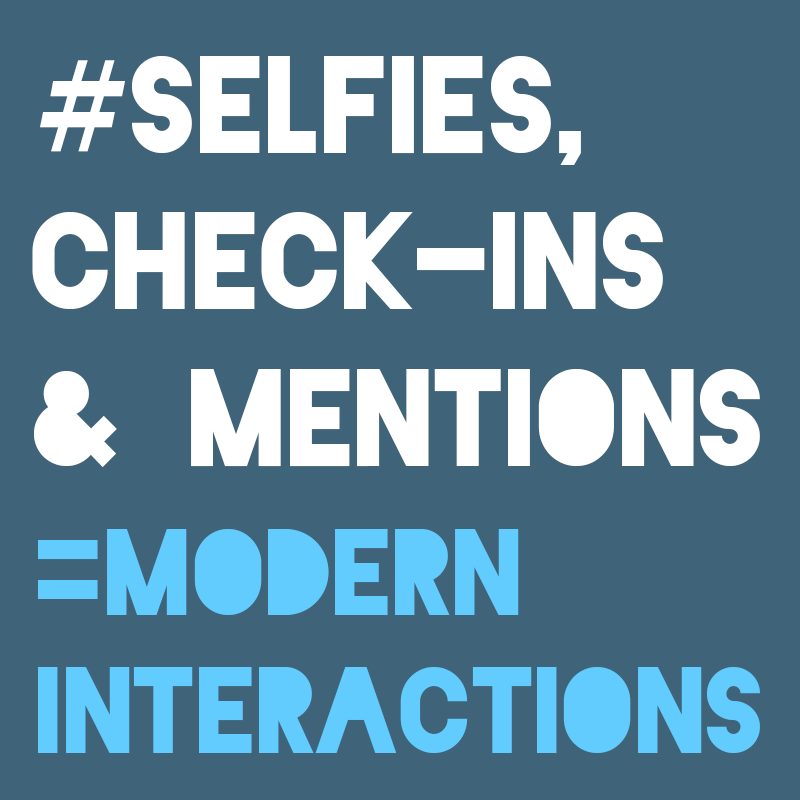
Cross branding happens when you tag yourself with friends, or other thought leaders in your field.
Online etiquette is digital reciprocity
Just like the story about my mother that I shared earlier proved, it is important to reciprocate in online social spheres. Now, on the smallest scale that could mean liking a status update on Facebook, or commenting on a photo. In a larger sense it could mean reaching out to thought leaders on Twitter to interview them for blog posts, or connecting those in your network, who you know have mutual interests. By sharing your knowledge online, and helping others, you will curate your online credibility. In this way, it's a win/win/win. Digital reciprocity is the new etiquette, and by learning these new online interaction techniques, you'll find yourself always ahead of the trend.
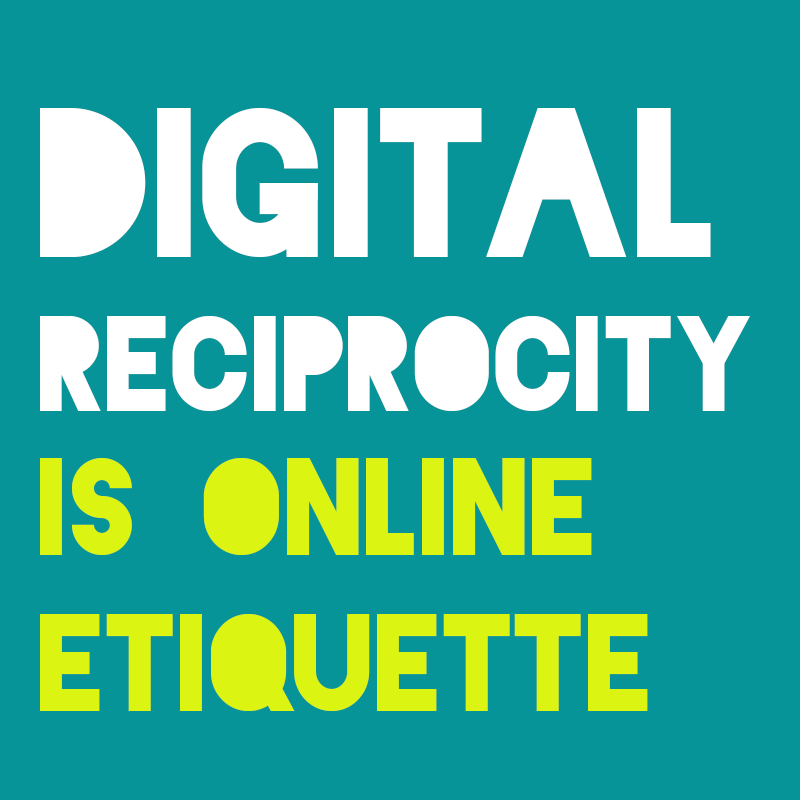
Don't snub your friends, loyal followers, and various audiences. Tag them. Share the love.